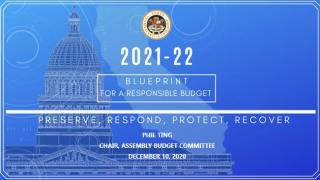Bills Championed by Ting Become State Law on January 1
 Even in a year when COVID-19 added constraints to the legislative process, Assemblymember Phil Ting (D-San Francisco) still had a successful 2020 with a number of bills taking effect on January 1, 2021, including:
Even in a year when COVID-19 added constraints to the legislative process, Assemblymember Phil Ting (D-San Francisco) still had a successful 2020 with a number of bills taking effect on January 1, 2021, including:
Economic Stimulus
AB 841 – Creates good paying green jobs to help CA’s economic recovery by:
- Temporarily redirecting unspent energy efficiency funds to help schools upgrade their HVAC systems to improve air flow, helping to prevent the spread of the coronavirus in classrooms; new grant program can also be used to upgrade old pipes that potentially leech lead into drinking water; priority given to applications from campuses in low-income communities
- Requiring the California Public Utilities Commission to act on its years-long application backlog of electric vehicle charging stations; faster approvals will get more people back to work
Criminal Justice Reform
AB 3234 – Allows judges to place first-time misdemeanor offenders into a diversion program; also modifies the Elderly Parole Program, so those aged 50 or above who have served a minimum of 20 years and don’t pose a public safety risk are eligible for a hearing to determine possible release
Housing Supply
AB 3182 – Prevents homeowners associations from completely banning rental units (including Accessory Dwelling Units); permits limiting rentals to 25% of a community’s total units, so they still qualify for federal loans and insurance
Environment
SB 212 with Senator Hannah-Beth Jackson and Assemblymember Adam Gray (2018) – Establishes a statewide take-back program for unwanted medication and needles with the help of the pharmaceutical industry. CalRecycle will be issuing regulations soon.
As with all urgency bills, Ting’s bill to help local jurisdictions address homelessness, AB 2553, took immediate effect upon the Governor’s signature in September. It grants city and county leaders the authority to temporarily suspend regulations in order to expedite the construction of emergency shelters and safe overnight parking areas.
In addition, ACR 165, designating a portion of State Route 35 in Daly City as the “Alice Peña Bulos Memorial Highway” did not require the Governor’s signature. The resolution’s passage in both houses this summer paved the way for supporters to raise private money for road signs honoring the local Filipina activist.
Finally, AB 793, the landmark law requiring manufacturers to include recycled materials in plastic CRV bottles, begins in 2022. Beverage containers must have at least 15% minimum recycled content in the first year, eventually reaching 50% by 2030 - the highest standard in the world.
# # # # # #
 (Sacramento) - California continues to face challenges due to COVID-19. Thanks to a one-time boost in revenues, the state is in a position to not only reverse some budget cuts made last year, but also maintain critical health and human services programs. Unfortunately, however, deficits are projected in subsequent years. With that in mind, Assemblymember Phil Ting (D-San Francisco), Chair of the Assembly Budget Committee, unveiled his 2021-22 Budget Blueprint, Preserve | Respond | Protect | Recover, calling for the restoration of funding in key priority areas to assist struggling Californians, while developing ways to stimulate the economy and grow reserves for future downturns.
(Sacramento) - California continues to face challenges due to COVID-19. Thanks to a one-time boost in revenues, the state is in a position to not only reverse some budget cuts made last year, but also maintain critical health and human services programs. Unfortunately, however, deficits are projected in subsequent years. With that in mind, Assemblymember Phil Ting (D-San Francisco), Chair of the Assembly Budget Committee, unveiled his 2021-22 Budget Blueprint, Preserve | Respond | Protect | Recover, calling for the restoration of funding in key priority areas to assist struggling Californians, while developing ways to stimulate the economy and grow reserves for future downturns.